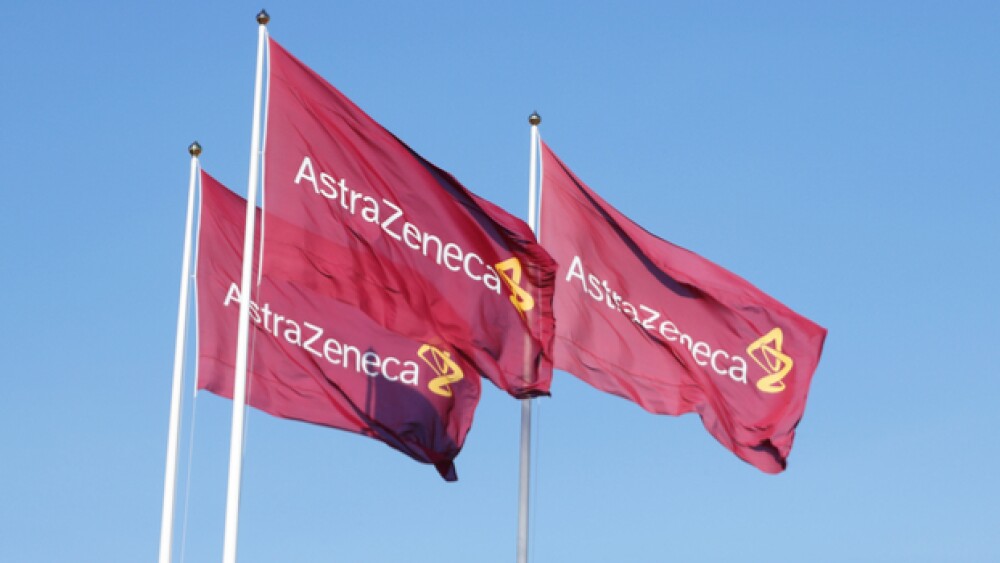Despite some setbacks, the company anticipates its vaccine could be available for use in the United Kingdom within the next several weeks.
Roland Magnusson/Shutterstock
AstraZeneca has seen a few setbacks with the COVID-19 vaccine it has developed with Oxford University, including a confusing efficacy outcome that resulted from the inclusion of a half-dose. Despite those setbacks, the company anticipates its vaccine could be available for use in the United Kingdom within the next several weeks.
This morning, Bloomberg reported that AstraZeneca expects the U.K. health ministry to sign off on its vaccine candidate. Earlier this month, the U.K. authorized the use of the vaccine developed by Pfizer and BioNTech and the first round of available doses have already been administered. During a Wednesday press conference, England’s Chief Medical Officer Chris Whitty suggested the vaccine could be approved within the first few weeks of January, which would boost the inoculation capabilities in that country. The U.K. has a deal for about 100 million doses of AstraZeneca’s vaccine.
Study data shows the vaccine candidate is safe and effective against the novel coronavirus. However, its efficacy is quite a bit lower than the mRNA vaccine developed by Pfizer and BioNTech, which has a 95% efficacy, and one developed by Moderna, which has a 94% efficacy. AstraZeneca’s efficacy is at 70.4%. During Phase III trials, one of the cohorts was administered one and a half doses, as opposed to two full doses. Vaccine efficacy in that cohort was up to 90%. The disparity is under investigation by the researchers.
AstraZeneca indicates it expects to have capacity to manufacture up to 3 billion doses in 2021 on a rolling basis. Its vaccine could have a greater reach than the mRNA vaccines due to less stringent conditions required for storage and transport.
Even as AstraZeneca closes in on potential authorization of its vaccine in the U.K., the company is exploring other ways to combat COVID-19.
AstraZeneca is partnering with INOVIO and multiple universities to advance INOVIO’s innovative DNA-encoded monoclonal antibody (dMAb) technology. The goal will be to develop anti-SARS-CoV-2-specific dMAbs which could offer versatile capabilities to function as both a therapeutic and preventive treatment for COVID-19. The research is being supported by a $37.6 million grant from the U.S. Defense Advanced Research Projects Agency (DARPA), as well as previous funding from the Bill and Melinda Gates Foundation.
Recombinant monoclonal antibodies are designed to enhance the immune system’s ability to regulate cell functions. However, there are some limitations, including cost and potential toxicity. INOVIO believes it has a solution to those concerns through encoding the DNA sequence for a specific monoclonal antibody in a DNA plasmid and deliver it directly into cells of the body. This will then the patient’s body to build its own highly specific antibodies.
In other COVID-19 news:
Mass Infections: Battling the pandemic through mass infections in order to develop a form of herd immunity has been a controversial approach to COVID-19. Those who have proposed such a strategy, including a top appointee in the Trump administration, suggested mass infections was a more palatable approach opposed to economic shutdowns. A number of emails sent by Paul Alexander, a Trump science adviser, show this was one of the strategies that had been discussed at some level to combat the ongoing pandemic.
“There is no other way, we need to establish herd, and it only comes about allowing the non-high risk groups expose themselves to the virus. PERIOD,” one of the emails reads, according to Politico. “Infants, kids, teens, young people, young adults, middle-aged with no conditions etc. have zero to little risk….so we use them to develop herd…we want them infected…”
Alexander was a top deputy to Health and Human Services assistant secretary for public affairs Michael Caputo. In addition to pushing the herd immunity strategy, which was not taken up by the administration, Alexander was instrumental in trying to shape a message that was favorable to Trump leading up to the elections. In its report, Politico noted Alexander attempted to spin messages that would cast blame on Democratic leaders in state and local governments for the spike of COVID cases in minority populations.
More Vaccine Development: In France, specialty vaccine company Valneva SE announced it was launching a Phase I/II study for its inactivated, adjuvanted COVID-19 vaccine candidate, VLA2001. The vaccine candidate leverages the manufacturing platform of Valneva’s licensed Japanese encephalitis vaccine, Ixiaro and is the first publicly announced inactivated vaccine against COVID-19 to begin clinical development in Europe.
The company currently plans to include more than 4,000 participants in additional trials, which it believes could support an initial regulatory approval as soon as the fourth quarter of 2021. The study will be conducted in the U.K. and will leverage a major COVID-19 vaccine partnership the company struck with the U.K. government in September. If vaccine development is successful, Valneva will provide the U.K. government with 60 million doses in the second half of 2021.
In The Clinic: This morning, Swiss pharma company Molecular Partners announced it is enrolling patients for its Phase I study of MP0420 (ensovibep), which targets three parts of the SARS-CoV-2 spike protein. The final dosing cohort is expected to enroll in the coming weeks and final data will be available in the first quarter of 2021. In October, Molecular Partners teamed up with Novartis to develop MP0420 and MP0423, both part of the company’s DARPin platform. If the Phase I study of MP0420 is strong, Novartis will take over clinical development.





